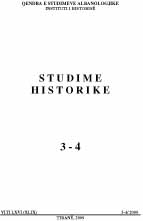Qëndrimi i shtetit shqiptar ndaj pakicës etnokulturore vllehe dhe asaj malazeze në vitet 1920-1924
The stand of the Albanian state toward the minorities of the Vlachs and the Montenegrins one during 1920-1924
Author(s): Beqir MetaSubject(s): History
Published by: Qendra e Studimeve Albanologjike
Keywords: Albanian state ; minorities of the Vlachs ; Montenegrins ; 1920-1924 ; Albania; Albanian History;
Summary/Abstract: The Albanian government with its declaration for the minorities in the League of Nations in 2 September 1921 adopted a liberal policy toward them. In this period the Vlachs achieved some successes. The Vlach schools that had functioned before the WWI were opened in the area of Korça. The Albanian authorities were sympathetic to the Vlach population and allowed the opening of some schools and Aromanian churches. However they were reluctant to increase the number of schools in the level demanded by some representatives of the Vlachs wile being concerned that such concessions would increase the Greek pressure toward Albania and would have created obstacles to the national unification process. A part of the Albanian Diaspora in Romania and the newspaper “Shqipëria e Re” (New Albania) supported the advancement of the demands of the Vlachs to increase the number of the Romanian schools wile echoing the Albanian-Romanian and Albanian-Vlach friendship. Also it highly esteemed the participation of some Vlachs as members of Albanian Parliament and the subsidization of the Vlach schools by the Albanian government. The government in the majority of the cases it tolerated the activity of the teachers with foreign citizenship in Aromanian schools something that was prohibited by the Treatises of the League of the Nations for the minorities. The Romanian government endeavoured to advance the status of the Vlachs. However, in the meantime it had not yet recognized the Albanian state, something that had raised critics in the Romanian parliament. Considering the friendly stand of the Albanian government a large number of Vlachs from Greece came and settled in Albania by also taking the Albania citizenship. The Albanian authorities created all the needed facilities for the granting of the citizenship and facilitating them from all the customs taxes for the livestock that brought with them. A tolerant stand was maintained also toward the modest Montenegrin minority in Vraka in the region of Shkodra. Conversely, during these years the Albania state and the Albanian Orthodox Church were faced with the interference of the Serbian Orthodox Church and Yugoslav state, which by using this minority tried to control the orthodox church of Shkodra and to extend their influence in the Synod of the Albanian Orthodox Church The Albanian government it kept open the Slavic school of Vraka, respected the Sllavic Orthodox Church of Vraka and obliged the Albanian landowner Sulçe bej Bushati to sell his properties to the farmers of this village. Also the Serb bishop Victor was allowed to hold masses as a guest in the Orthodox Church of Shkodra.
Journal: Studime Historike
- Issue Year: 2009
- Issue No: 03-04
- Page Range: 045-066
- Page Count: 22
- Language: Albanian
- Content File-PDF

